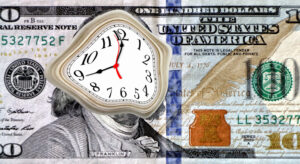The Trigger for the Next Great Depression
The comments below are an edited and abridged synopsis of an article by Bert Dohmen
During bear markets of the past 30 years inflation pressures were subdued, so the record money creation of the past 10 years apparently did not cause a visible problem. Inflation lags money creation.
But inflation has broken out and hit the highs made in 1980 to 1982. If the Fed were to stimulate the markets with another round of money printing in order to avoid a recession until next year, inflation would go to the all-time record high of 1917, when the CPI soared over 19%.
From 2008 to 2018, the Fed increased its balance sheet by five times. Since then it has doubled again through mid-2022, so now it is 10x the size of what it was in 2008.
History shows that this dilution of the purchasing power of legal tender always creates hyperinflation, and ends in disaster.
However, economists, politicians and Fed officials assure us that inflation is a temporary and will decline soon. They don’t say why or how. But they have, in the US, passed a $739 billion spending bill with big tax increases. It’s called the Inflation Reduction Act, but it will trigger the next Great Depression.
Over the past 12 years, money creation in major economies has soared to record historic highs. It is no longer just a US problem, it’s a global problem.
This year, money supply hit 40%, a rate never seen before. A rise of 8% used to be alarming, but now no analyst or economist bothers to mention the growth rate. Are they trying not to scare investors?
The Fed’s balance sheet reached $9 trillion this year; it has taken that much artificial money to keep the financial system glued together. That is exactly what is creating today’s inflation. This is what Zimbabwe, Venezuela and other hyperinflation countries have done.
The Fed seems to be hoping that inflation might decline through an act of nature. But wishful thinking doesn’t cure inflation. And when the economic recession is finally recognized, the Fed may be urged to step on the accelerator again.
Inflation is the most important economic factor. The only way to fight it is by contracting liquidity and reducing credit. Central banks hesitate to do this because it causes financial markets to plunge, and economies to go into recession.
Therefore, central banks typically just hike interest rates, thinking that will reduce inflation as it may reduce borrowing. That is wrong if borrowing is still possible. Higher interest rates cause a rise in the cost of business, which is then passed on in the form of higher prices.
Tight (unavailable) money is the only way to get inflation down. But that is bitter medicine. If you want to survive the next 8 years, prepare now. The trigger for the next depression has been pulled.

